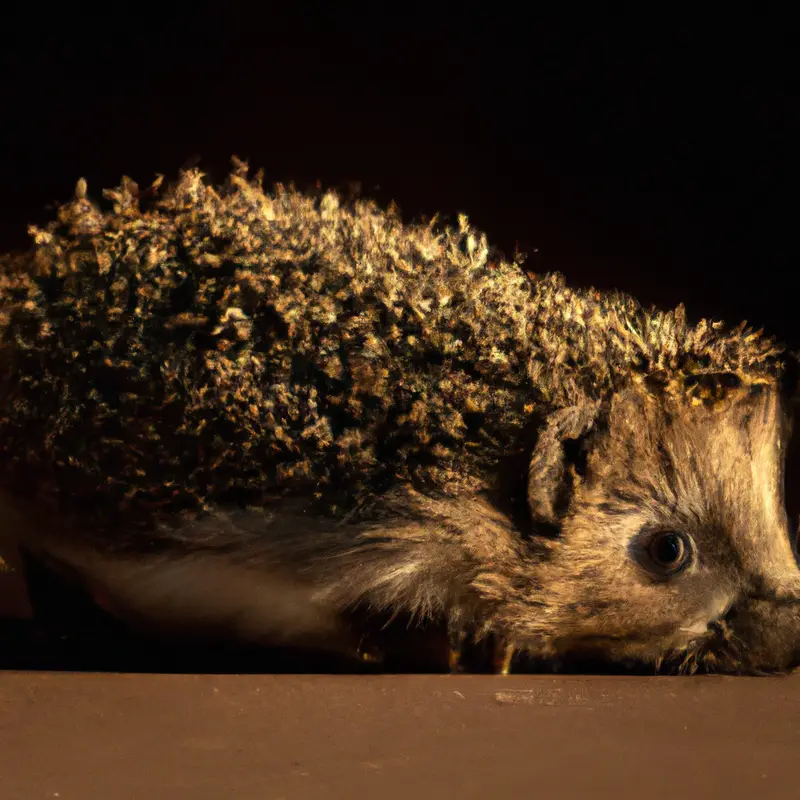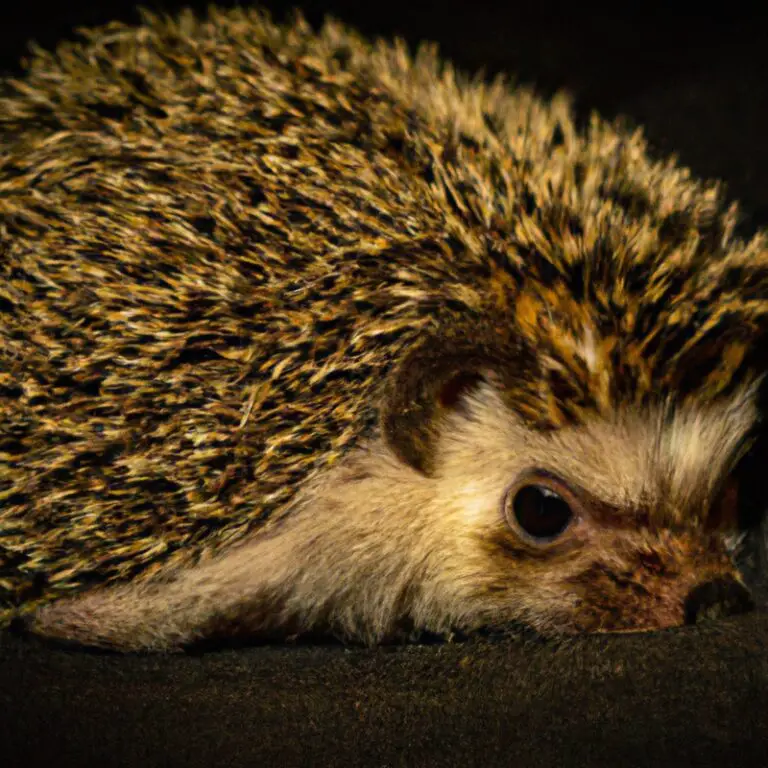What Is The Role Of Hedgehogs In Maintaining Soil Health?
Key Takeaways:
- Hedgehogs play a crucial role in maintaining soil health by controlling pest populations.
- Their foraging behavior helps to aerate and mix soil, improving its composition.
- Hedgehog droppings contribute to nutrient cycling and enhance soil fertility.
- Providing habitats for hedgehogs can promote overall ecosystem health and biodiversity.
Do you ever stop to think about the tiny creatures that play a big role in maintaining the health of our soil? Well, hedgehogs are one such unsung hero in the ecosystem! These spiky little creatures do much more than just look cute and scurry around our gardens.
In fact, they have a vital role to play in maintaining soil health.
From acting as natural pest controllers to aiding in soil aeration and nutrient cycling, hedgehogs have earned their place in the garden ecosystem. So, let’s dive into the incredible world of hedgehogs and discover how they contribute to the well-being of our soil.
| Role of Hedgehogs | In Maintaining Soil Health |
| 1 | Help control pests such as slugs and insects |
| 2 | Aerate the soil by digging and rooting |
| 3 | Distribute nutrients by their feces |
| 4 | Create small tunnels that improve soil drainage |
| 5 | Break down plant materials through their feeding habits |
Role of Hedgehogs in Maintaining Soil Health
Hedgehogs play a vital role in maintaining soil health.
Brief overview of hedgehogs in general
Hedgehogs are small, spiky mammals that are native to Europe, Asia, and Africa. They are known for their unique appearance and nocturnal habits.
Hedgehogs have a protective layer of spines on their back, which they curl into a ball when threatened.
They are primarily insectivores, feeding on insects, worms, and occasionally small vertebrates. Hedgehogs are solitary creatures and prefer to live in hedgerows, grasslands, and woodlands.
They play a crucial role in maintaining soil health by feeding on pests that can harm plants and promote the decomposition of organic matter.

Importance of soil health
Soil health is crucial for the growth and productivity of plants, which ultimately affects the entire ecosystem. Here’s why soil health is important:
- Nutrient Cycling: Healthy soil provides a balanced supply of essential nutrients for plants, helping them grow and thrive.
- Water Retention: Good soil health improves water holding capacity, reducing the risk of erosion and ensuring plants have access to moisture.
- Carbon Sequestration: Healthy soil acts as a carbon sink, helping to mitigate climate change by storing carbon dioxide.
- Biodiversity Support: Healthy soil supports a diverse range of microorganisms, insects, and other organisms that contribute to a balanced ecosystem.
- Disease and Pest Suppression: A healthy soil ecosystem helps control the spread of plant diseases and reduces pest infestations.
By prioritizing soil health, we can promote sustainable agricultural practices and ensure the long-term viability of our ecosystems.
Hedgehogs as Natural Pest Controllers
Hedgehogs are natural pest controllers who help to keep the population of insects and other small creatures in check. They are efficient predators, feeding on pests like slugs, snails, and insects that can damage plants and crops.
By hunting and consuming these pests, hedgehogs contribute to maintaining a healthy balance in the ecosystem.
This natural pest control method is not only effective but also environmentally friendly, as it reduces the need for harmful chemical pesticides. So, having hedgehogs in your garden can be beneficial for both your plants and the environment.
Diet of hedgehogs
Hedgehogs have a diverse diet that primarily consists of insects, such as beetles, slugs, and worms.
They also eat small vertebrates like frogs, mice, and even birds’ eggs.
In addition to animal matter, hedgehogs may consume fruits, berries, and occasionally mushrooms.
Their diet plays a crucial role in maintaining soil health as they control the population of pests and help with nutrient cycling through their droppings.
The wide variety of food they consume ensures a balanced ecosystem in garden habitats.

Impacts of hedgehogs on pest populations
Hedgehogs play a crucial role in maintaining soil health by their impacts on pest populations. Here are a few ways hedgehogs contribute to controlling pests:
- Hedgehogs eat insects: Hedgehogs have a diet that consists of insects such as beetles, slugs, snails, and caterpillars. By feeding on these pests, hedgehogs help control their populations and prevent them from damaging crops or gardens.
- Reduction of pest damage: With their appetite for pests, hedgehogs help reduce the damage caused by insects in gardens and agricultural areas. This contributes to the overall health and productivity of the soil.
- Natural pest control alternative: Hedgehogs offer a natural and environmentally friendly alternative to chemical pesticides. Their presence in an ecosystem helps maintain a balanced pest population without the need for harmful chemicals.
- Seed dispersal: Hedgehogs also play a role in seed dispersal, as they consume fruits and berries and then deposit the seeds at various locations through their droppings. This helps promote plant growth and biodiversity.
Benefits of natural pest control for soil health
Natural pest control provides several benefits for soil health.
- It maintains a healthy balance in the ecosystem by controlling pest populations, which can otherwise disrupt the soil’s natural processes.
- This method reduces the need for harmful chemical pesticides that can negatively impact soil health, such as by killing beneficial organisms or contaminating the soil.
- By promoting biodiversity, natural pest control supports the presence of helpful organisms like earthworms and beneficial insects, which can improve soil structure and nutrient cycling.
- It also helps prevent the spread of plant diseases, protecting the overall health of the soil and the plants growing in it.
Overall, natural pest control ensures a sustainable and thriving soil ecosystem, enhancing its ability to support healthy plant growth.
Hedgehogs as Soil Aerators
Hedgehogs play an important role in maintaining soil health as natural soil aerators. As they forage for food, their movements help to loosen and aerate the soil.
This improves soil structure and allows for better root penetration and water absorption.
Hedgehogs also create small burrows and tunnels, which enhance soil drainage and reduce the risk of soil compaction. By encouraging hedgehogs in your garden, you can promote a healthy and fertile soil environment.
Hedgehogs and their burrowing behavior
Hedgehogs are known for their adorable appearance, but did you know they also play a vital role in soil health through their burrowing behavior?
When hedgehogs burrow, they dig tunnels in the soil, which helps to aerate it, allowing oxygen to reach plant roots and promoting nutrient absorption.
Their burrowing also helps to break up compacted soil, and their droppings act as a natural fertilizer.
Additionally, these burrows provide shelter for other beneficial organisms like insects and fungi.
So, next time you see a hedgehog in your garden, appreciate their cute looks and the valuable work they do for the soil!
Effects of hedgehog burrows on soil structure
Hedgehog burrows can have positive effects on soil structure. Their digging activities help to aerate the soil, allowing better oxygen and water circulation.
This promotes healthier root growth and nutrient absorption for plants.
The burrows also mix and redistribute organic matter, improving soil fertility. Additionally, the network of tunnels created by hedgehogs can enhance soil drainage, reducing the risk of waterlogging.
Overall, hedgehog burrows play a crucial role in maintaining a healthy and well-structured soil environment.
Significance of soil aeration for plant growth
Soil aeration is incredibly important for plant growth.
It helps with the exchange of gases, allowing oxygen to reach the plant’s roots and carbon dioxide to be released.
This process promotes root development, nutrient absorption, and overall plant health.
When the soil is well-aerated, it also prevents the buildup of excess moisture, which can lead to root rot.
Adequate soil aeration is essential for healthy and thriving plants in any garden or farm.
Hedgehogs and Nutrient Cycling
Hedgehogs play an important role in nutrient cycling within ecosystems. As they forage for food, they disturb the soil, promoting nutrient availability and decomposition.
Their feces also contribute to the nutrient content of the soil.
Additionally, hedgehogs consume insects and other small invertebrates that can damage plants and disrupt nutrient cycles. By keeping these populations in check, hedgehogs indirectly contribute to healthier soil and nutrient cycling.
Overall, hedgehogs contribute significantly to maintaining the balance of nutrients in the soil.
Hedgehogs as seed dispersers
Hedgehogs play a role in seed dispersal by eating fruits and seeds, then dispersing them through their droppings. As they move around, hedgehogs inadvertently transport seeds to new areas, helping to promote plant diversity and colonization.
This process contributes to ecological balance and the restoration of degraded habitats.
So, next time you spot a hedgehog in your garden, remember that they’re not only cute but also important in maintaining the health of our soil.
Role of hedgehog droppings in nutrient recycling
Hedgehog droppings play a vital role in nutrient recycling in soil. When hedgehogs deposit their droppings, they introduce valuable nutrients such as nitrogen, phosphorus, and potassium back into the soil.
These nutrients are essential for the growth and development of plants.
Additionally, hedgehog droppings also contain valuable organic matter, which enhances soil structure and provides a food source for beneficial microbes. As a result, the presence of hedgehogs in an ecosystem can help maintain soil health and fertility.
Impact of nutrient cycling on soil fertility
Nutrient cycling plays a significant role in maintaining soil fertility.
As plants grow, they absorb nutrients from the soil.
Nutrient cycling helps replenish these nutrients by breaking down organic matter, such as fallen leaves and dead plants, into their basic components.
This process releases essential elements like nitrogen, phosphorus, and potassium back into the soil.
These nutrients are then available for uptake by plants, promoting their growth and ensuring a healthy soil ecosystem.
Nutrient cycling is essential for sustainable agriculture and helps maintain long-term soil fertility.
Hedgehogs and Weed Control
Hedgehogs play a significant role in weed control.
These prickly creatures have a natural diet that includes insects and small invertebrates, some of which are harmful to plants.
By eating these pests, hedgehogs help keep populations in check and reduce the need for chemical pesticides.
Their foraging behavior also helps to aerate and till the soil, which can promote healthy plant growth and prevent weed establishment.
So, having hedgehogs around can be beneficial for maintaining weed control in your garden or outdoor space.
Hedgehogs’ preference for insects and invertebrates
Hedgehogs have a strong preference for insects and invertebrates. These small mammals rely on a diet mainly composed of these creatures.
Hedgehogs are insectivores and their diet consists of a variety of insects such as beetles, slugs, worms, and snails.
This preference for insects and invertebrates is rooted in their natural biology and evolution. By consuming these organisms, hedgehogs play an important role in maintaining the balance of insect populations and contribute to the overall health of ecosystems.
Their diet also helps to control pests in gardens and agricultural areas, making them beneficial to human activities as well.
Reduction of weed seeds due to hedgehog foraging
Hedgehogs play a beneficial role in maintaining soil health by reducing the number of weed seeds. As hedgehogs forage for food, they consume various sources, including weed seeds.
By doing so, they help to limit the spread of weeds in the area where they live.
This can be especially helpful in agricultural settings or gardens, where weed control is important. Hedgehogs naturally contribute to the overall health and biodiversity of the soil by minimizing the presence and growth of weed seeds through their foraging habits.
Connection between weed control and soil health
Weed control plays an important role in maintaining soil health.
- Weeds compete with crops for nutrients, sunlight, and water, and inhibit their growth.
- By controlling weeds, we allow crops to thrive and maximize their yield potential.
- Additionally, weeds can alter soil composition, reducing its quality and fertility.
- Effective weed control methods, such as mechanical removal or herbicide application, can prevent weed-induced soil degradation.
- By maintaining a weed-free environment, we can promote healthier soil and ensure the optimum growth conditions for our crops.
Conservation of Hedgehogs for Soil Health
Hedgehogs play a vital role in maintaining soil health through their foraging behavior. As they search for food, they naturally aerate the soil, improving its structure and allowing better water penetration.
Additionally, their droppings serve as a natural fertilizer, enriching the soil with nutrients.
By creating protected areas and providing suitable habitats, we can conserve hedgehogs and ensure their continued contribution to soil health. Let’s appreciate and support these cute creatures for the benefits they bring to our environment.
Threats to hedgehog populations
Threats to hedgehog populations include habitat loss and fragmentation, from urbanization and agriculture. They are also affected by road traffic and predation from domestic pets.
Pesticides and the decline of insect populations affect their food supply.
Climate change can also impact their hibernation patterns and food availability. It is important to raise awareness and take action to protect hedgehog habitats, create wildlife corridors, and promote sustainable farming practices.
Importance of habitat conservation for hedgehogs
Habitat conservation is crucial for hedgehogs to thrive.
Protecting their habitats ensures they have access to food, shelter, and suitable breeding grounds.
By preserving their natural habitats, we are helping hedgehogs maintain a balanced ecosystem and ensuring their survival.
Conservation efforts can include creating hedgehog-friendly gardens, reducing pesticide use, and maintaining green spaces.
These actions play a significant role in safeguarding hedgehogs and promoting healthy soil ecosystems.
Promoting hedgehog-friendly gardening practices
To promote hedgehog-friendly gardening practices, you can start by creating a welcoming habitat for hedgehogs in your garden.
Provide shelter by leaving piles of leaves or wood, and avoid using chemicals that can harm them.
Ensure there are gaps in fences for them to pass through and provide a shallow dish of fresh water.
Avoid using slug pellets and instead encourage natural pest control methods.
Finally, if you have a pond, make sure there is a way for hedgehogs to escape if they fall in.
Frequently Asked Questions
Frequently Asked Questions:
1. How do hedgehogs contribute to maintaining soil health?
Hedgehogs aid in soil health by foraging and feeding on insects, slugs, and snails that can be harmful to plants. As they consume these pests, they naturally help control their populations, preventing overgrowth and damage to soil and vegetation.
2. Are hedgehogs beneficial for garden soil?
Yes, hedgehogs are beneficial for garden soil. Their feeding habits help maintain a balanced ecosystem by controlling pests that can harm plants.
Additionally, their droppings act as a natural fertilizer, enriching the soil with nutrients.
3. How can I attract hedgehogs to my garden?
To attract hedgehogs, provide shelter such as log piles or hedgehog houses. Create small openings in fences to allow them access.
Provide a water source like a shallow dish and leave out food like wet cat or dog food, mealworms, or specially formulated hedgehog food.
4. Should I use pesticides in my garden if I have hedgehogs?
Using pesticides in your garden can harm hedgehogs and disrupt their role in maintaining soil health. Instead, opt for natural pest control methods like companion planting or using biological controls such as nematodes or ladybugs.
5. Can hedgehogs damage my garden?
While hedgehogs forage for food, they may occasionally cause some disturbance in terms of digging or uprooting plants. However, their benefits far outweigh any minor disruptions, and their role in controlling pests ultimately benefits the overall health of your garden soil.
6. What else can I do to support hedgehogs’ impact on soil health?
Creating garden habitats with diverse plant species, avoiding the use of chemical fertilizers or pesticides, and providing safe access routes between gardens can all help support hedgehogs in their quest to maintain soil health.
Do hedgehogs harm soil health?
Hedgehogs do not harm soil health.
In fact, they play a beneficial role in maintaining the health of the soil.
Hedgehogs help control the population of pests like slugs, snails, and insects, which can damage plants and crops.
By feeding on these pests, hedgehogs support a natural balance in the ecosystem and contribute to the overall well-being of the soil.
Additionally, their underground burrowing activities help aerate the soil, enhancing its structure and nutrient circulation.
So, having hedgehogs around can actually be beneficial for soil health.
How can I attract hedgehogs to my garden?
To attract hedgehogs to your garden, there are a few simple things you can do:
- Provide food: Offer a dish of water and leave out hedgehog-friendly food like wet cat or dog food, mealworms, or specially-made hedgehog food.
- Create habitat: Make your garden hedgehog-friendly by allowing areas of your lawn to grow wild, leaving leaf or log piles, and providing safe places for hedgehogs to hibernate, like wooden shelters or compost heaps.
- Ensure access: Hedgehogs need access to different areas, so create small holes or gaps in your garden fences or walls to allow them to move freely.
- Avoid chemicals: Refrain from using pesticides or slug pellets in your garden, as they can harm hedgehogs and their food sources.
Are hedgehogs protected species?
Yes, hedgehogs are protected species in many countries.
In the United Kingdom, for example, hedgehogs are protected under the Wildlife and Countryside Act 1981.
This means that it is illegal to intentionally kill, harm, or disturb hedgehogs or damage their nests or breeding sites without a special license.
It’s important to respect and protect these adorable creatures to ensure their survival in the wild.
Can hedgehogs be kept as pets?
Yes, hedgehogs can be kept as pets. They are small, adorable creatures that can make great companions.
However, it’s important to note that hedgehogs require specialized care, so it’s crucial to do your research and understand their needs before bringing one home.
Here are some key points to consider:
- Hedgehogs are nocturnal animals, which means they are most active at night. You’ll need to adjust your schedule and provide them with a quiet and dark sleeping area during the day.
- Proper diet is essential for hedgehogs. They have specific nutritional requirements, including a balanced mix of high-quality cat food, insects, and vegetables.
- Hedgehogs need a suitable enclosure that provides enough space for them to move around, along with hiding spots, toys, and a solid wheel for exercise.
- These animals have unique personalities and temperaments. While some hedgehogs may enjoy being handled and socialized, others may be more aloof and prefer less interaction.
- Regular veterinary care is crucial for maintaining your hedgehog’s health. They may require vaccinations, routine check-ups, and potential treatment for common health issues.
Remember, owning a hedgehog requires commitment, patience, and a willingness to provide the appropriate care they need. It’s essential to ensure that owning a hedgehog fits your lifestyle and that you have the time, resources, and knowledge to meet their needs.
Encouragement to appreciate and support hedgehog populations
To appreciate and support hedgehog populations, here are a few suggestions:
- Create hedgehog-friendly habitats by leaving areas of your garden wild and untidy, providing cover and food sources.
- Install hedgehog houses and provide fresh water in your garden to create safe spaces for them to rest and hibernate.
- Avoid using pesticides and chemicals in your garden, as these can be harmful to hedgehogs and their food sources.
- Be mindful of hedgehogs while gardening, checking for them before starting any tasks that could harm or disturb them.
- Educate yourself and others about these amazing creatures, their behaviors, and how we can protect them.
- Support local hedgehog rescue organizations and wildlife charities working to conserve and rehabilitate hedgehogs.
By taking these simple steps, you can contribute to the conservation and well-being of our spiky friends!
Final Verdict
Hedgehogs play a crucial role in maintaining soil health through their natural pest control abilities, soil aeration behavior, nutrient cycling activities, and weed control efforts. By preying on pests, burrowing underground, dispersing seeds, and aiding in nutrient recycling, hedgehogs contribute to a balanced ecosystem that supports soil fertility and plant growth.
However, their populations are threatened, emphasizing the need for conservation efforts and hedgehog-friendly gardening practices.
By appreciating and supporting hedgehogs, we can not only protect these adorable creatures but also encourage a healthier and more sustainable soil environment.







